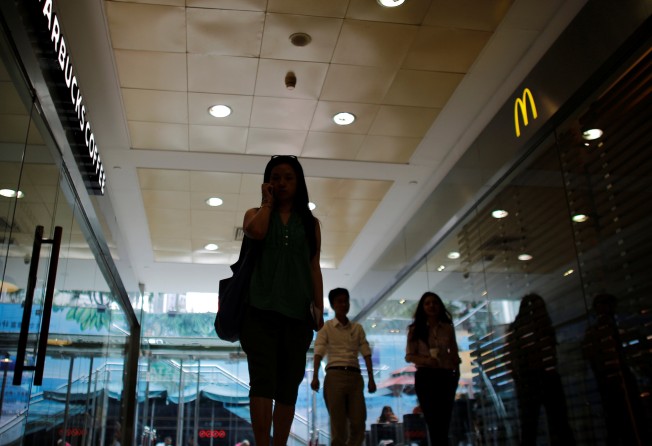Future bright for China’s shopping malls despite e-commerce threat, says DBS Vickers
Higher salaries and house prices will encourage spending on luxury goods as malls offer customers an experience they can’t find online

China’s shopping malls are in for a good three years despite the threat from online retailers and a recent slowdown in consumption, according to brokerage firm DBS Vickers.
Higher salaries and house prices in major Chinese cities, and tighter controls over money leaving the country will spur robust personal spending, especially on luxury goods, said Carol Wu, the company’s head of research for Hong Kong and China.
Shopping centres have been taking on the challenge from e-commerce by offering their visitors something their internet-based rivals cannot: a complete experience.
Restaurants, cafes, entertainment areas for children, and even educational classes are an increasingly common feature of malls as they embrace “experiential” shopping and opt for the type of outlets that cannot be replaced by online vendors, said Wu.
“The impact of online shopping has been mitigated over the past two years because shopping mall operators have adjusted their selection of tenants,” said Wu. “Retail space used to account for 70 to 80 per cent of a shopping mall, but it’s only 50 per cent now.”
China’s retail sales growth slowed in August to 10.1 per cent year on year, the worst in six months and weaker than the market consensus of 10.5 per cent, according to a Bloomberg poll.
However, retailers of luxury goods and cars contacted by DBS Vickers had reported solid sales, Wu added.
Luxury spending has underpinned steady growth in consumption since the end of last year. Bricks-and-mortar retailers had taken a hit from the rise of e-commerce, Beijing’s anti-corruption campaign – which targeted, among other things, lavish spending by officials – and the stock market crash in 2014 and 2015, said DBS Vickers’ research director Mavis Hui.
Rising incomes and house prices in top-tier cities will continue to boost consumption, because high-end shoppers “usually have several properties and would feel good when home prices rise, because they think their net worth also increased,” said Wu.
The difficulty in channelling money abroad caused by the government’s strict capital controls will also stimulate domestic spending, she added. Shopping centres will be able to charge higher rates on luxury stores’ turnover as their sales increase.
Another factor in their favour is that there is hardly an over-abundance of malls in mainland China. Their sales area equates to less than 0.6 square metres per head of population for urban residents, much lower than the 2.4 per sq m in the US and 1.6 sq m in Canada, Wu said.
About 30 to 50 per cent of shopping mall projects will be cancelled or delayed in the next three years because of difficulties in leasing and construction, even though China’s top 30 cities will see the number of retail precincts jump by almost 50 per to 1,445, she said.
Mall owners with good operations are likely to post rental growth higher than 10 per cent, said Wu. China Resources Land and Longfor Properties will be the top players in the sector, while Joy City Properties and Hang Lung Properties were rated “Buy”.
Wu and Hui were speaking during a press conference at which the company was sharing its outlook for China’s shopping mall sector.